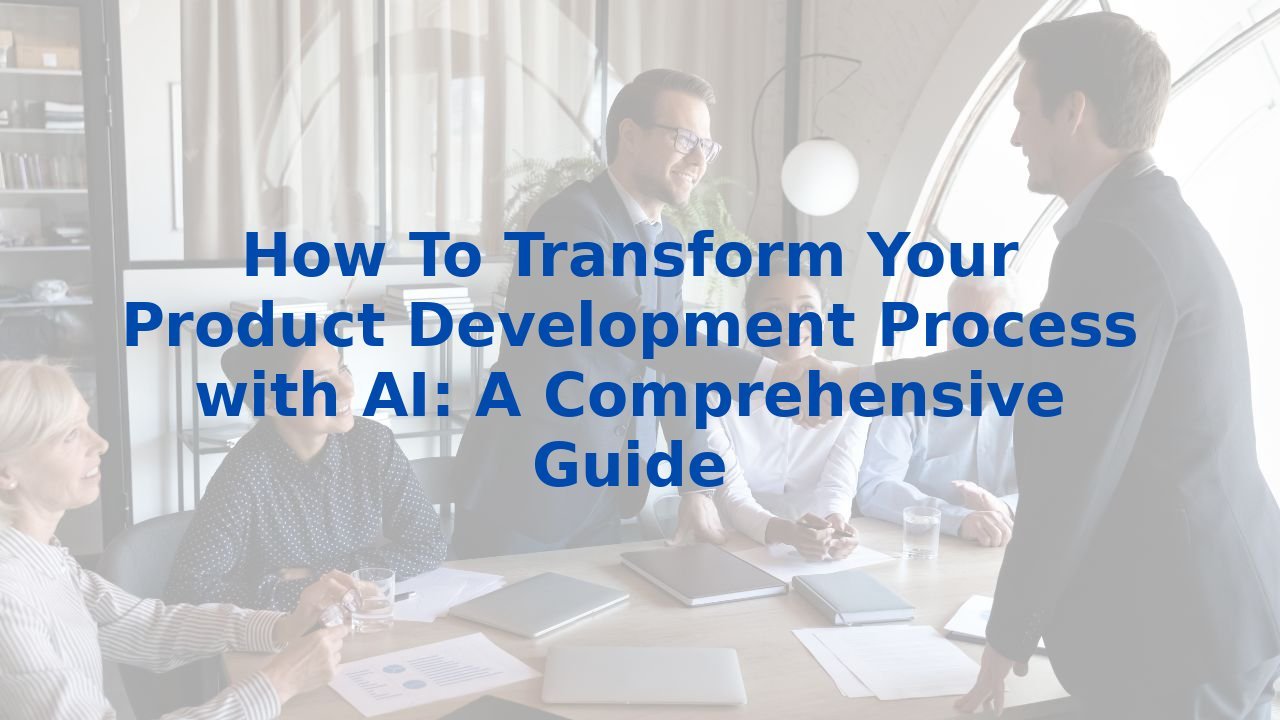How To Transform Your Product Development Process with AI: A Comprehensive Guide
How To Transform Your Product Development Process with AI: A Comprehensive Guide
The Future of Product Development: Leveraging AI for Efficiency and Success
In the dynamic world of product development, the dawn of Artificial Intelligence (AI) is reshaping traditional methods into powerful, streamlined processes. This transformative technology isn’t just a trendy add-on; it’s a necessity for organizations aiming to stay relevant and competitive. By embracing AI, businesses can not only boost efficiency but also enhance decision-making capabilities, driving sustained success in their ventures.
The Role of AI in Product Development
AI acts as a catalyst in today’s product development landscape. From automating tedious tasks to offering predictive insights, its potential to enhance efficiency is boundless. Here’s how AI can make a difference:
- Data Analysis: AI algorithms excel at sifting through vast amounts of data at lightning speed, exposing trends and patterns that might go unnoticed by human analysts. This robust analysis assists organizations in making well-informed decisions regarding product features and market strategies.
- Predictive Analytics: With the power of past data and market trends, AI can foresee consumer behavior, enabling product managers to prioritize features likely to yield the highest returns. This forward-thinking approach is crucial for maintaining a competitive edge.
- Automated Testing: In the world of product development, thorough testing is non-negotiable. AI-driven tools can automate this process, significantly reducing not only time but also costs. This ensures that the final product launches without technical hiccups, embodying reliability and quality.
- Customer Feedback Analysis: AI can efficiently analyze customer feedback from multiple channels, distilling actionable insights that can be leveraged to refine and enhance the product. This ensures that organizations remain in tune with consumer sentiments and needs.
Roles in Product Development
Successful product development is a symphony of collaboration among various professionals, each playing a vital role in ensuring that products resonate with consumer expectations. Here are the key players:
- Product Managers: These critical guides navigate the product through its various stages, striking a balance between customer needs and company vision. Their role is essential in steering the product through obstacles toward successful realization.
- Product Directors: Tasked with overseeing the user experience, quality, and growth, product directors ensure that the product not only functions effectively but also resonates with the target audience's expectations.
- Founders: The dreamers behind the product, founders translate innovative ideas into viable products. Their strategic vision sets the tone for the entire product development process.
Continuous Improvement: Driving Success
To thrive in a competitive environment, continuous improvement is fundamental. Here are some effective strategies:
- Value Over Perfection: Organizations must prioritize delivering real value to customers over chasing perfection. Meeting customer needs is the cornerstone of sustainable success.
- Profitability: It’s essential to ensure that product features deliver value, boosting customer Return on Investment (ROI). Sustainable growth hinges on functionality that resonates with customer needs.
- Regular Refinement: Commitment to regular product refinement keeps consumer value alive. This entails ongoing testing, feedback collection, and iterative enhancement.
The Benefits of AI Training for Employees
To truly harness the power of AI, organizations must invest in adequately training their teams. AI training brings a multitude of benefits:
- Enhanced Decision-Making: Equipping employees with AI training amplifies their decision-making capabilities, providing them the tools necessary to analyze data effectively and make informed predictions.
- Improved Efficiency: By automating mundane tasks, AI liberates employees to engage in high-value, creative endeavors necessitating strategic thought—this is where true innovation resides.
- Competitive Advantage: Businesses that invest in comprehensive AI training set themselves apart in a crowded market, leveraging advanced technologies and methodologies to outpace their competition.
Conclusion
In summary, infusing AI into product development can catalyze transformative benefits ranging from dynamic data analysis to automated testing processes. By understanding the collaborative roles within product development and committing to continuous improvement, organizations solidify their potential for profitability and success. Furthermore, by investing in training their employees in AI, businesses unlock not just skills but also a competitive edge that propels them forward in an ever-evolving marketplace. The future belongs to those who dare to innovate—are you ready to embrace it?
If you're interested in exploring AI training options or how to equip your entire workforce with essential AI skills, consider a comprehensive training program designed to elevate your organization.



